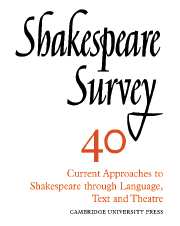Book contents
- Frontmatter
- Reconstructing Shakespeare, or Harlotry in Bardolatry
- Playing Shakespeare
- Take me to your Leda
- Sign Theory and Shakespeare
- Time in Richard III
- New Concepts of Staging A Midsummer Night’s Dream
- Henry V as Working-House of Ideology
- Shakespeare and his Sources: Observations on the Critical History of Julius Caesar
- The Speculative Eye: Problematic Self-Knowledge in Julius Caesar
- Learning by Talking: Conversation in As You Like It
- Measure for Measure: Mirror for Mirror
- Allegory and Irony in Othello
- Cruelty, King Lear and the South African Land Act 1913
- The Rationale of Current Bibliographical Methods: Printing House Studies, Computer-Aided Compositor Studies, and the Use of Statistical Methods
- Shakespeare’s Late Plays at Stratford, Ontario
- Shakespeare Performances in London, Manchester and Stratford-upon-Avon 1985–6
- The Year's Contributions to Shakespearian Study 1 Critical Studies
- 2 Shakespeare’s Life, Times, and Stage
- 3 Editions and Textual Studies
- Index
Shakespeare and his Sources: Observations on the Critical History of Julius Caesar
Published online by Cambridge University Press: 28 March 2007
- Frontmatter
- Reconstructing Shakespeare, or Harlotry in Bardolatry
- Playing Shakespeare
- Take me to your Leda
- Sign Theory and Shakespeare
- Time in Richard III
- New Concepts of Staging A Midsummer Night’s Dream
- Henry V as Working-House of Ideology
- Shakespeare and his Sources: Observations on the Critical History of Julius Caesar
- The Speculative Eye: Problematic Self-Knowledge in Julius Caesar
- Learning by Talking: Conversation in As You Like It
- Measure for Measure: Mirror for Mirror
- Allegory and Irony in Othello
- Cruelty, King Lear and the South African Land Act 1913
- The Rationale of Current Bibliographical Methods: Printing House Studies, Computer-Aided Compositor Studies, and the Use of Statistical Methods
- Shakespeare’s Late Plays at Stratford, Ontario
- Shakespeare Performances in London, Manchester and Stratford-upon-Avon 1985–6
- The Year's Contributions to Shakespearian Study 1 Critical Studies
- 2 Shakespeare’s Life, Times, and Stage
- 3 Editions and Textual Studies
- Index
Summary
Conspicuous in my title, the term 'source' is today highly problematic. Critics now understand 'source' variously and employ as well many different terms in its place. These terms, each one rich in its own embedded metaphors and critical implications, embody conflicting notions about what a source is and about how it functions. Our tacit acceptance of these conflicts has resulted in radical redefinition of sources and a revaluation of their relations to texts. To illustrate such changes, this essay will examine the critical history of Julius Caesar, a play that bears a close and complex relationship to a long-established specific source, North's Plutarch. The issues raised in this discussion should be pertinent, however, to less established sources, the tragedies of Seneca, let us say, and, of course, to other plays.
'Source', from the Old French 'sors', derives from 'sourdre', 'to rise or spring'. A source is a 'support'; 'the act of rising on the wing'; 'the fountain-head or origin of a river or stream'; 'the chief or prime cause of something of a non-material or abstract character'. A work of art then may rise from a source and leave it behind or it may flow from a source, existing in poised and dynamic tension, ever dependent on the source for its being. We often speak of tracing things to their sources, assuming then that there are connecting lines always present and discernible.
- Type
- Chapter
- Information
- Shakespeare Survey , pp. 69 - 76Publisher: Cambridge University PressPrint publication year: 1988
- 2
- Cited by

